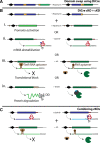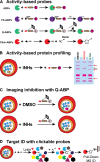Proteases as antimalarial targets: strategies for genetic, chemical, and therapeutic validation
- PMID: 28599096
- PMCID: PMC5575534
- DOI: 10.1111/febs.14130
Proteases as antimalarial targets: strategies for genetic, chemical, and therapeutic validation
Abstract
Malaria is a devastating parasitic disease affecting half of the world's population. The rapid emergence of resistance against new antimalarial drugs, including artemisinin-based therapies, has made the development of drugs with novel mechanisms of action extremely urgent. Proteases are enzymes proven to be well suited for target-based drug development due to our knowledge of their enzymatic mechanisms and active site structures. More importantly, Plasmodium proteases have been shown to be involved in a variety of pathways that are essential for parasite survival. However, pharmacological rather than target-based approaches have dominated the field of antimalarial drug development, in part due to the challenge of robustly validating Plasmodium targets at the genetic level. Fortunately, over the last few years there has been significant progress in the development of efficient genetic methods to modify the parasite, including several conditional approaches. This progress is finally allowing us not only to validate essential genes genetically, but also to study their molecular functions. In this review, I present our current understanding of the biological role proteases play in the malaria parasite life cycle. I also discuss how the recent advances in Plasmodium genetics, the improvement of protease-oriented chemical biology approaches, and the development of malaria-focused pharmacological assays, can be combined to achieve a robust biological, chemical and therapeutic validation of Plasmodium proteases as viable drug targets.
Keywords: malaria; protease; target validation.
© 2017 The Authors. The FEBS Journal published by John Wiley & Sons Ltd on behalf of Federation of European Biochemical Societies.
Figures




References
-
- Ranson H & Lissenden N (2016) Insecticide resistance in African Anopheles mosquitoes: a worsening situation that needs urgent action to maintain malaria control. Trends Parasitol 32, 187–196. - PubMed
-
- Wells TNC, van Huijsduijnen RH & Van Voorhis WC (2015) Malaria medicines: a glass half full? Nat Rev Drug Discov 14, 424–442. - PubMed
-
- Turk B (2006) Targeting proteases: successes, failures and future prospects. Nat Rev Drug Discov 5, 785–799. - PubMed
Publication types
MeSH terms
Substances
Grants and funding
LinkOut - more resources
Full Text Sources
Other Literature Sources
Medical
Molecular Biology Databases

